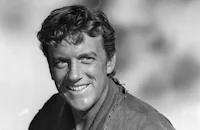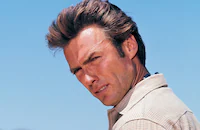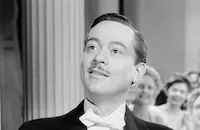The First Traveling Saleslady

Brief Synopsis
Cast & Crew
Arthur Lubin
Ginger Rogers
Barry Nelson
Carol Channing
David Brian
James Arness
Film Details
Technical Specs

Synopsis
In New York in 1897, inventor Charlie Masters crashes his horseless buggy into saleslady Rose Gillray's wagon. Despite his boasts about his automobile's superiority, he cannot start it and Rose is forced to pull it with her horse. At her business office, the Gillray Corset Company, Charlie annoys Rose further by ridiculing her suffragette leanings. In her office, Rose fits singer Molly Wade with a new corset, whose daring design is being rejected all over town. After loosening her shoe strap, Rose is inspired to propose the corset as a costume for Molly's current revue. They bring the costume, along with a song, to theatrical producer Martin Schlessinger, but he will not consider it until Rose threatens to take the idea to his competitor. Immediately, however, the police close the revue because of the scandalous outfits, and Rose's office is picketed by the Purity League. In deep debt to James Carter's steel company, which supplied her the garter stays, Rose rejects her assistant's offer to spirit her out of town and instead confronts Jim. After overhearing him complain to Teddy Roosevelt that his tons of barbed wire are virtually unsalable in the West, where large ranchers have convinced their smaller colleagues that wire will hurt the cattle, Rose boldly suggests that she sell the wire for him to work off her debt. Although Jim rejects the plan as far too dangerous for a woman, he invites her to dinner, intrigued by her spirit. Promptly falling in love with her, Jim issues a warrant for Rose's arrest in order to force her to abandon her plan, but she sneaks out of town with his wire disguised in a box marked "corsets." At the first train stop, Rose is outsmarted by the male salesmen, who elbow her out of the trolley which is heading into town. Luckily, Charlie, on his way to show his invention in California, drives by and offers her a ride into town. When the car breaks down, Rose, upon loosening her shoe, realizes that her corset stay can serve as a replacement part, and they are soon on their way. Although Charlie scoffs at Rose's feminist ideas, he is powerless to deny her the opportunity to drive his car. After she drives it into a ditch, they begin a quarrel that ends when Charlie kisses Rose, who returns his kiss before hopping onto a passing wagon. At the town hotel, Rose finds Molly, now assisting a traveling magician, and persuades Molly to join her. They head to Kansas City, where a Cattlemen's Association meeting is taking place in their hotel. As Rose schemes to find a room in the overbooked hotel, Molly flirts with young Rough Rider Lt. Jack Rice. Upon hearing that Texas cattle baron Joel Kingdon has been placed in a room earlier reserved for the Prince of Wales, Rose decides to sell Joel on the idea of barbed wire. To that end, she pretends to be the prince's American contact and, entranced, Joel offers his room to the ladies and invites them to dinner. In the hallway, however, his cohort Cal, who has found the wire in Rose's bags, reveals her real purpose, prompting Joel to set into motion a ruse to thwart her. At dinner that night, Joel pays a judge to pretend that the rancher is pro-barbed wire, then invites Rose to visit him in Texas. Back in the room, the prince's arrival forces Rose and Molly to sleep in the ladies' lounge, where they are awoken by Charlie, who is also in Kansas City looking for a place to sleep. After Rose and Charlie bicker, Rose directs Jim to send a shipment of wire to Texas, then heads there with Molly. As soon as they step off the train, they are abducted by Joel's men, who transport them to the county border, where they are unceremoniously dumped and told to walk home. Despite their warning that any barbed wire salesmen caught in Texas will be hanged, Rose insists on returning to town to telegraph Jim to stop the wire shipment. Along the way, she and Molly are thrilled to see Charlie, who offers them a ride but needs Rose's corset stay to fix the engine. At the telegraph office, Joel confronts Rose, admitting that he was waiting for her over the borderline. Charlie, amused by the proceedings, decides to stay, as do Rose and Molly, even though Joel has ordered all the locals to refuse service to the women. Rose is about to give up when she loosens her shoe and realizes she must sell the wives on barbed wire. Over the next few days, she explains the wire's benefits to all the ranch women, who agree to meet in town. Before the meeting, however, Joel has Rose arrested for "cruelty to animals," and Jim soon arrives in town to post her bail. After Jim proposes to Rose, Joel, also planning to propose, beats up Jim. Joel has Rose and Molly forcibly brought to his ranch. They are followed by Charlie, who is knocked out and hidden by Joel's men. Rose turns down Joel's proposal, after which Jack arrives with the Rough Riders to free the women. Back in town, when no one shows up for the meeting, Molly leaves with Jack. Charlie teases Rose that women should stay in the kitchen, prompting her to rant about men until he proposes marriage, which she accepts, admitting she cannot go on alone. By loosening her shoe, Rose is inspired to demand a hearing in defense of barbed wire, at which the jury is packed with Joel's rancher friends. Although the opposition lies to prove the wire is harmful to animals, Charlie arranges for the ranchers' wives to herd the cattle into town, where the cows avoid a barbed wire fence, proving the wire's efficacy. As the ranchers gather to place orders for Jim's wire, Jim and Joel commiserate over losing Rose. Later, while driving to California, Charlie tells Rose about a new flying machine, and is horrified to discover that she cannot wait to sell it.

Director
Arthur Lubin
Cast

Ginger Rogers

Barry Nelson
Carol Channing

David Brian

James Arness

Clint Eastwood
Robert Simon
Frank Wilcox
Daniel M. White
Harry Cheshire

John Eldredge
Robert Hinkle
Kate Drain Lawson
Edward Cassidy
Fred Essler
Bill Hale
Lovyss Bradley
Nora Bush
Ann Kunde
Hans Herbert
Lynn Noe
Joan Tyler
Janette Miller
Kathy Marlowe
Robert Easton
Belle Mitchell
Ian Murray
Gilmore Bush
John Connors
Lester Dorr
Frank Scannell
Paul Keast
Mauritz Hugo
Julius Evans
Stanley Farrar
Charles Tannen
Hank Patterson
Britt Wood
James Stone
Cactus Mack
Deacon Moor
Lane Chandler
Chalky Williams
George Barrows
George Baxter
George Brand
Tris Coffin
Theron Jackson
Herbert Deans
William Fawcett
Casey Macgregor
William Forrest
Jim Hayward
Earl Hodgins
Johnny Lee
Pierce Lyden
Jack Rice
Tony Roux
Roy Darmour
Peter Croyden
Al Cavens
Paul Bradley
Hal Taggart
Crew
Albert S. D'agostino
Edward Donahoe
Devery Freeman
Larry Germain
Irving Gertz
Irving Gertz
S. G. Haughton
Terry Kellum
Hal Levy
Stephen Longstreet
Arthur Lubin
Otto Ludwig
Richard Mayberry
Dorothy Reid
Bert Schoenfeld
Darrell Silvera
William Snyder
Edward Stevenson
Ira Stewart
Frank Westmore

Film Details
Technical Specs

Articles
The First Traveling Saleslady
As Rose and her showbiz sidekick Molly (Carol Channing) head west to sell their contentious product, they discover they are less than popular with the local cowboys, headed by Joe Kingdom (James Arness of the TV series Gunsmoke). The two women are hobbled at every turn, as the angry cowpokes try to run them out of town, certain that the new-fangled wire will injure the cattle. The women's only friend is horseless carriage inventor Charles Masters (Barry Nelson of Stanley Kubrick's The Shining [1980]) who has a habit of arriving at the height of their distress.
At the time, much ado was made of Rogers' return to RKO, which had fallen on hard times by the mid-50s. She put a good face on things: "It was good to be home again...They gave me the same dressing room. It was a little dusty, but that was taken care of in a hurry," she said in several publications. Later, in the wake of the film's bad reviews, followed by the closing of the studio, Rogers would wryly take credit for having single-handedly shut down RKO.
The script for The First Traveling Saleslady was initially offered to Mae West, who declined, and according to many of the film's reviewers, Rogers might have been wiser to do the same. "Lame, offbeat, an interesting but failed experiment, The First Traveling Saleslady only underlined the emptiness of such backward-looking fare in changing times," wrote Patrick McGilligan, author of Ginger Rogers (Pyramid Publications, 1975).
The First Traveling Saleslady didn't do much for its co-stars either. Carol Channing reportedly stayed away from films for years in the wake of its box-office belly-flop. For Clint Eastwood, who plays her beau, the film offered him his first substantial speaking part in a movie. Director Arthur Lubin, who had directed Eastwood in uncredited roles in Lady Godiva of Coventry (1955) and the "Francis the Talking Mule" spin-off Francis in the Navy (1955), even gave Eastwood "introducing" billing in this film. But though he was described as "very attractive" by the Hollywood Reporter, any positive benefit was quickly lost in the picture's less-than-spectacular reviews.
Rogers was undaunted though by the poor reception of The First Traveling Saleslady. The RKO portion of her career permanently closed, she went on to do Teenage Rebel (1956), for Twentieth Century-Fox. Despite the title, that film was actually a thoughtful coming-of-age drama and a worthy showcase for Rogers' acting skills.
Producer: Arthur Lubin
Director: Arthur Lubin
Screenplay: Devery Freeman, Stephen Longstreet
Cinematography: William E. Snyder
Art Direction: Albert S. D'Agostino
Music: Irving Gertz
Film Editing: Otto Ludwig
Cast: Ginger Rogers (Miss Rose Gillray, Gillray Corset Co.), Barry Nelson (Charles Masters), Carol Channing (Molly Wade), David Brian (James Carter, president, Carter Steel), James Arness (Joel Kingdom), Clint Eastwood (Lt. Jack Rice, Roughrider), Robert F. Simon (Cal, Texas Rancher), Frank Wilcox (U.S. Marshal Duncan), Daniel M. White (Sheriff).
C-92m. Closed Captioning.
by Emily Soares

The First Traveling Saleslady
Quotes
Trivia
Originally intended to star Mae West.
Notes
The film begins with a written foreword stating that although America in 1897 was a man's world, the American woman was preparing to take it away from him. Arthur Lubin's onscreen credit reads, "Produced and directed by Arthur Lubin." Although the CBCS lists Brian Keith as playing "James Carter," the role was played by David Brian, who is credited correctly onscreen. The First Traveling Saleslady marked the first production under RKO's new studio head, William Dozier. Hollywood Reporter noted on November 18, 1955 that RKO made a deal with Arthur Lubin Productions under which the studio would distribute and solely finance the production. According to an November 8, 1955 Hollywood Reporter news item, Betty Grable was originally set to play "Rose Gillray." The film was shot partially on location in Chatsworth, CA. Broadway star Carol Channing made her feature film debut in The First Traveling Saleslady, and as a result of her performance, according to a March 1956 "Rambling Reporter" item in Hollywood Reporter, had her contract re-optioned by RKO, as did James Arness. Although the CBCS lists both Clarence Muse and Johnny Lee as "Amos," Lee played the role in the final film.

Miscellaneous Notes
Released in United States Summer August 1956
Released in United States Summer August 1956














